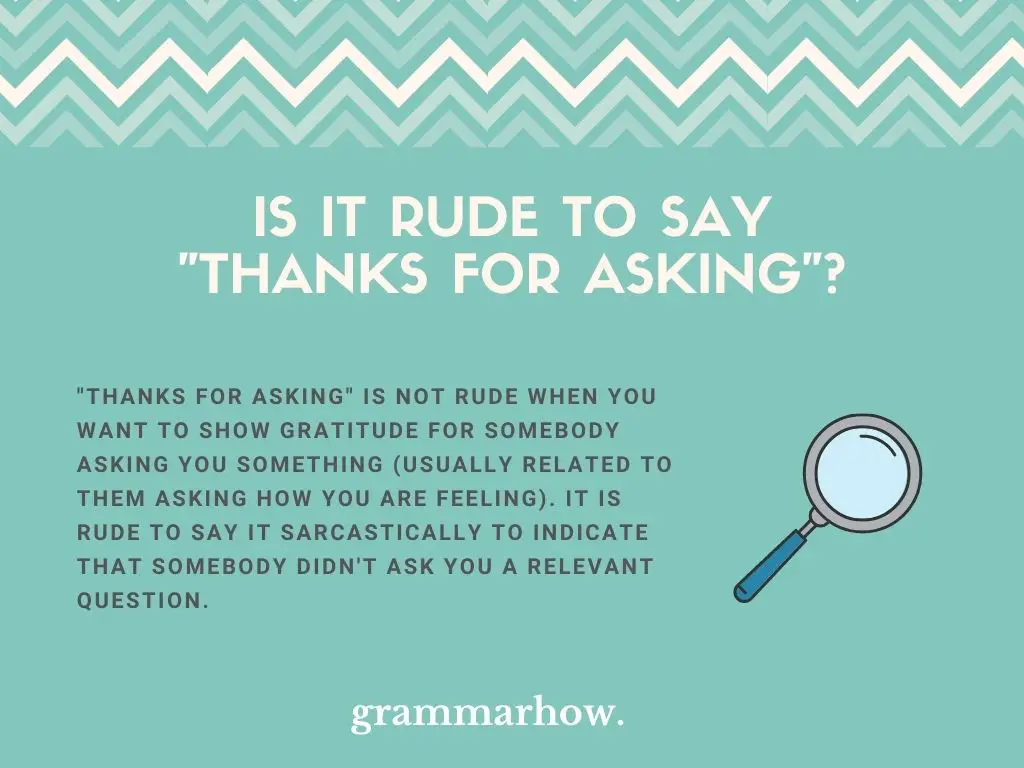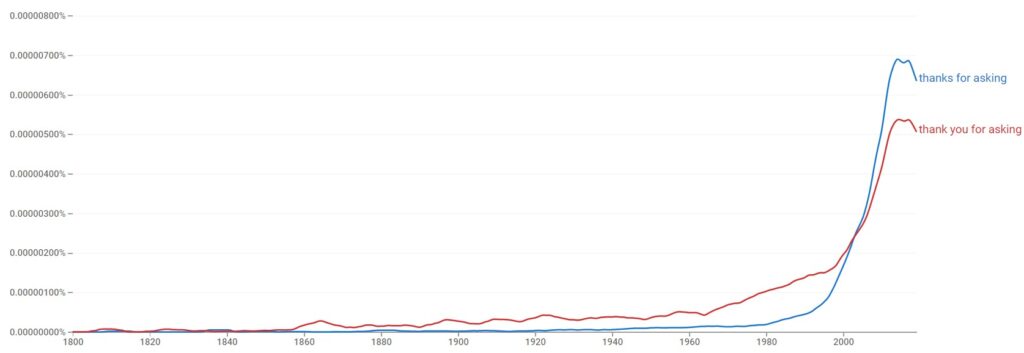The phrase “thanks for asking” is both rude and polite, depending on who you ask and how you use it. One of the joys of using the English language is changing your tone to change your meaning slightly. This article will explore the phrase and how to use it.
Is It Rude To Say “Thanks For Asking”?
“Thanks for asking” is not rude when you want to show gratitude for somebody asking you something (usually related to them asking how you are feeling). It is rude to say it sarcastically to indicate that somebody didn’t ask you a relevant question.

To help you understand it slightly better, we’ll include some basic examples:
- How are you today?
- I’m good, thanks for asking!
Here, we’re genuinely happy that somebody asked us how we are feeling. This is the polite way to use the phrase to indicate that we’re glad someone took an interest in our lives or how we’re feeling.
- You’re finally here.
- Oh, I’m also fine, thanks for asking.
Here, we see it in the ironic or sarcastic sense. The person speaking to us didn’t ask us how we were doing and instead made an impatient statement about something. We answered as if they asked how we were feeling and then used “thanks for asking” to reiterate that they did not ask.
This is a really rude way to say it (though typically, it’s disrespectful of the person not to ask you how you’re feeling as well). It’s best to avoid using it in this way if you can.
Is It “Thanks For Asking” Or “Thank You For Asking”?
You can generally use “thanks” as the shortened form of “thank you.” Most native speakers believe “thank you” to be more formal and polite, but do the same rules apply when we look at how it affects the meaning of this phrase?
According to this graph, “thanks for asking” is slightly more popular than “thank you for asking,” though there isn’t a noticeable difference. Both phrases seem to have followed the same trend lines throughout history as well.

What’s interesting about this graph is that we can use both phrases interchangeably. There doesn’t seem to be much difference when using one over the other.
However, most native speakers see “thank you for asking” as the more polite variation of the two. For that reason, it’s more common to use “thank you for asking” in a polite manner after somebody asks you how you are and not in a sarcastic manner.
- How are you feeling today?
- I’m much better now, thank you for asking.
As you can see, we use “thank you for asking” here in a more polite manner. It’s typical to use this when somebody has asked us about ourselves.
What Does “Thanks For Asking” And “Thank You For Asking” Mean?
“Thanks for asking” and “thank you for asking” mean that we’re happy somebody asked us a question. Usually, that question is about ourselves or about whether we’re interested in doing something.
The content of the question isn’t what’s most important here. Instead, it helps us more to know whether we’re happy that the person engaged us or not. For example:
- How are you?
- I’m good, thanks for asking.
- Would you like to do this with me?
- I’m busy, but thank you for asking!
Both of these questions can be replied to with either phrase. The question relates to our well-being or whether we’re able to do something with the asker. Either way, if we’re happy that they considered us enough to ask the question, we can show our gratitude with the phrase.
Examples Of How To Use “Thanks For Asking” And “Thank You For Asking” In A Sentence
Let’s go through some examples of using both phrases in sentences. We thought we’d group it into two parts, first showing the polite variation, then showing the rude one.
Polite
- Will you accompany me tonight?
- I’m afraid I can’t, but thanks for asking though!
- Are you free to chat?
- No, I’m not; but thank you for asking, though! Maybe later?
- I need your help with something if you don’t mind?
- Sure, I’m happy to help! Thank you for asking me.
- Are we able to see each other later?
- No, but thank you for asking!
- How are you doing today?
- I’m good, thanks for asking.
In the polite form, we use either “thanks” or “thank you.” We do so to indicate that we’re happy we’ve been asked a question, and we’re more than happy to answer it.
Sometimes, we’ll even reply “no” or some other negative response. While “no” on its own is harsh, adding “thanks for asking” to the end makes it much nicer for the asker to hear, thus taking away from the rudeness of the situation.
Rude
- Where have you been?
- Don’t worry about me; I’m good, thanks for asking.
- You’re late. Again.
- And my mother needed me at the hospital, thank you for asking.
- Don’t bother giving me an excuse this time.
- I wasn’t going to. My dog is fine, though, thanks for asking.
- Can you help me with this?
- I’m kind of preoccupied, if you didn’t realize; thanks for asking.
- Are you lazy?
- No, but I’m not interested in helping you. Thank you for asking.
With the rude variations, we use “thanks” or “thank you for asking” to indicate that we’re not happy that somebody didn’t ask us a question. It’s similar to saying “not that you asked,” which means we didn’t receive a question, but we’re answering one anyway.
Typically, “thanks” is the better choice for this variation as it’s slightly more informal compared with “thank you.”
3 Better Ways To Thank Someone For Asking In A Polite Way
There are a few different ways we can thank somebody for asking us politely. Since “thank you for asking” is sometimes seen as rude, you’ll be better off with one of the following:
- I appreciate your concern.
- It is very nice of you to ask me.
- Thank you so much for being so concerned.
“I appreciate your concern” is the preferred version of the bullet points above. It offers the most polite (and formal) way to appreciate somebody’s efforts in asking you a question about yourself.
I Appreciate Your Concern
“I appreciate your concern” works well when we want to show gratitude and appreciation for somebody asking something about us. It’s the most polite replacement for “thank you for asking” that you should use in a workplace.
To help you understand how it works, we’ll include some examples:
- How are you feeling now?
- I’m much better now, and I appreciate your concern.
- If there’s anything else I can do, will you let me know?
- I will, and I appreciate your concern.
- Do you need help with your shopping bags?
- No, I’m okay, thank you, but I appreciate your concern.
“I appreciate your concern” is a direct synonym for “thank you for asking.” We can completely replace it in any sentence, and it would still make sense.
It Is Very Nice Of You To Ask Me
“It is very nice of you to ask me” is another great choice for a more polite and formal option. This time, we’re using “very nice” to indicate that the person asking us a question is nice and kind for doing so.
Again, “it is very nice of you to ask me” is synonymous with “thanks for asking,” allowing us to simply replace the phrases and match the meaning.
- Are you doing okay?
- Yes, I am, and it is very nice of you to ask me.
- I’m here to help. Is there anything you need?
- Well, it is very nice of you to ask me! I have a few things you could do.
- What else can I do for you?
- I’m okay for the time being, but it is very nice of you to ask me.
Thank You So Much For Being So Concerned
“Thank you so much for being so concerned” is similar to “I appreciate your concern” but less commonly used. It’s still a great replacement in polite situations to indicate your gratitude for somebody’s concern over you.
- Do you need me to do anything else?
- No, but thank you so much for being so concerned.
- I was so worried about you after the accident!
- I’m okay now, though! Thank you so much for being so concerned.
- If you need me, let me know!
- I will do that! Thank you so much for being so concerned.
What Should I Reply To “Thanks For Asking”?
To reply to “thanks for asking” in a polite way, you should say “you’re welcome” or “no problem.” To reply to “thanks for asking” in a rude way, you should ignore their comment or apologize for not asking them how they were (to avoid confrontation).
If we write it in the polite way, it might look like this:
- How are you?
- I’m good, thanks for asking.
- No problem!
In the rude way, we might see it like so:
- You’re late.
- And I’m fine after the accident, thanks for asking.
- I’m sorry I didn’t ask; I’m glad you’re okay.
